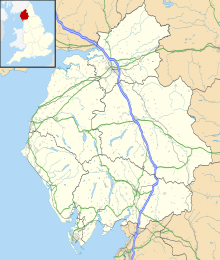Our website is made possible by displaying online advertisements to our visitors.
Please consider supporting us by disabling your ad blocker.
Woodhouse Colliery
| Location | |
|---|---|
| Location | Whitehaven |
| County | Cumbria |
| Country | England |
| Coordinates | 54°31′31.8″N 3°35′49.7″W / 54.525500°N 3.597139°W |
| Production | |
| Products | Coal |
| Production | 3,000,000 tonnes (3,300,000 tons) projected per annum |
| History | |
| Opened | (projected) |
| Owner | |
| Company | West Cumbria Mining (WCM) |
| Website | Official website |
Woodhouse Colliery, also known as Whitehaven coal mine, is a proposed coal mine near to Whitehaven in Cumbria, England. The coal mine has been advertised as bringing jobs to a deprived area, but has also come in for criticism by green campaigners.[1] The mine is proposed by West Cumbria Mining and plans to extract coking coal from beneath the Irish Sea for 25 years. The plan has been criticised by some MPs, scientists and environmentalists due to the coal mine's environmental impact and the UK government's legal commitments to reduce UK carbon emissions.[2][3][4]
The planning application has been under consideration since 2019, when Cumbria County Council granted planning permission for the venture. The colliery would be the first new deep coal mine in the United Kingdom in 30 years (the last such development was the Asfordby pit in 1986).[5][6] It is not to be confused with the former Woodhouse Close Colliery in Woodhouse Close, Bishop Auckland (County Durham) which operated between 1835 and 1934.[7]
The government initially took the view that the decision should be a local one, but became involved in March 2021, putting the project on hold. There was speculation that Robert Jenrick, the Secretary of State involved, was influenced by the forthcoming United Nations Climate Change Conference, held that year in Glasgow, but he did not give a reason.[8] Michael Gove, Jenrick's successor as Secretary of State, gave planning consent in December 2022,[9] but faced legal challenges which had not been resolved by the time of the 2024 United Kingdom general election. After the election, as well as uncertainty about the outcome of the court case, there was some uncertainty about whether the incoming Labour government would oppose the project. However, shortly before the court hearing, the new Secretary of State expressed the view that the previous government's decision to approve Woodhouse Colliery was unlawful because emissions had not been taken into consideration.[10]
- ^ "Young climate activists add to calls to halt planned Cumbria coal mine". ITV News. 8 February 2021. Retrieved 10 April 2022.
- ^ "Whitehaven coal mine approved for third time". BBC News. 3 October 2020. Retrieved 7 January 2021.
- ^ "Mixed reactions to news of West Cumbria Mining plans overcoming major hurdle". News and Star. 7 January 2021. Retrieved 7 January 2021.
- ^ "Looking back at south Cumbria's extraordinary 2020". nwemail.co.uk. Retrieved 7 January 2021.
- ^ "Jenrick criticised over decision not to block new Cumbria coal mine". The Guardian. 6 January 2021. Retrieved 7 January 2021.
- ^ Greene, Tommy (4 February 2021). "Cumbria coalmine plans pit climate protection against job creation". The Guardian. ISSN 0261-3077. Retrieved 6 February 2021.
- ^ "Durham Mining Museum - Woodhouse Close Colliery". www.dmm.org.uk. Retrieved 11 July 2018.
- ^ "Boris Johnson could clash with backbenchers over coalmine". The Guardian. 12 March 2021. Retrieved 25 March 2021.
- ^ "First UK coal mine in decades approved despite climate concerns". BBC News. 7 December 2022. Retrieved 28 March 2023.
- ^ Pickard, Jim; Millard, Rachel; Bryan, Kenza; Mooney, Attracta (11 July 2024). "Labour considers ban on new North Sea licences in pipeline". Financial Times. Retrieved 4 August 2024.
Previous Page Next Page




